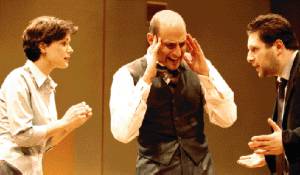|
Loading
|
|
|

Sour smell of success
Hollywood morality stinks in an acidly funny David Mamet revival, says John Peter, The Sunday Times, 19 March 2000
The easiest way to describe Speed-the-Plow (New Ambassadors) would be to call it a bleak, black comedy set in Hollywood. This is fine as far as it goes; but, as usual with David Mamet's plays, even an accurate description is only half the story.
Bob Gould (Mark Strong) and Charlie Fox (Patrick Marber) are producers at the same studio. Bob is also head of productions, which in theory gives him stronger teeth. Charlie has brought a project to Bob: a well-known director wants to do a script he is keen on. Bob will now take him and the script to the head of the studio and recommend it for production. It looks like all systems go, until the appearance of Bob's temporary secretary, Karen (Kimberly Williams).
Until now, the atmosphere has been like a clearing in the forest where two wolves share their kill. Now it becomes a sexual marketplace where the two men strut their stuff, turning themselves into characters in a little play where the noise of wisecracks almost drowns the sound of heavy breathing. Bob, being in the chair behind the desk, clearly has the advantage, but Charlie has grown reckless with the stink of success and bets Bob $500 that he can't take Karen home and have her.
Karen is nothing out of the ordinary: a crisp, earnest, immaculately turned-out twentysomething American executive toy with average bedroom potential. Bob and Charlie have now turned her into a commodity, as if she were a script; and Bob makes the move that can be fatal for precisely such a man and such a girl: he pretends to appeal to her mind. Williams knows exactly who and what Karen is: a sincere, lightweight little person who has been temporarily overcome by the scent of power, the kind of young woman who, given half a chance, will start spouting commonplaces of dreary sincerity as if they were eternal verities.
Williams plays her with cool, calm, intelligent detachment: she neither mocks Karen nor portrays her as a pushy little kitten, nor turns her into a victim oozing precious life. The point, hers and Mamet's, is that Karen is simply a wide-eyed gazelle who has blundered into the wrong forest clearing and thinks she is among equals. What happens now is that Bob gives her a dreadful novel that he has no intention of turning into a film script. It is about radiation and the end of life, and sounds like the most ghastly piece of moral-environmental chic. Karen is to read it and bring it to his house that evening with her comments. It looks as if Bob might get his $500. Meanwhile, Karen has inhaled the contaminated air of power. She begins to think she could be somebody here.
The ensuing scene, on Bob's immense scarlet sofa, is a piece of psychological high comedy, and Peter Gill's direction is at its most subtle, precise and unostentatious. Karen is bowled over by this unspeakably banal book; Bob, ingratiating but increasingly appalled, begins to sense that if he is to win his bet, he might have to like it. The air throbs with the sticky excitement of third-rate ambition.
One of the pleasures of Gill's production is the way he and his actors handle the text. Mamet's writing is an extraordinary blend of realism and artifice: high-pressure articulacy and fractured, brutal inarticulacy are arranged in a cunningly theatrical pattern that is as elegant and formal in its way as restoration comedy. Accordingly, Strong plays Bob as almost the American equivalent of the restoration rake, lean and wolfish, with a core of boyish innocence and something of the night about him. Marber is more the restoration underdog, bear-like and a little hunched, like an ageing boxer determined not to show his years. It may be this posture, but something is wrong with Marber's voice: it tends to come in short bursts and sounds unrelaxed, and when he increases the volume, it sounds forced. A couple of hours a day of intensive voice work may be no bad thing.
The ending is as bleak and hard as the beginning is sanguine and boisterous. Speed-the-Plow is a play about values set in a world where value is subject to contract. It is a morality play set in a world where moral principles do not apply. Breaking a promise may be wrong, but it is inevitable. Our own Ken Livingstone broke his promise because the vote had been rigged; in Mamet's play, the world you live in is rigged. Hollywood is to American literature what Thebes was to the Greek tragedians: a place of semi-mythical reality where your moral qualities are tested under the indifferent eyes of godlike executives who have their own games to play and who do not care a toss whether you pass the test. Do you have a tragic flaw? Forget it: the world is flawed.
In the dreadful apocalyptic novel that poor Karen is so desperate to promote, there is a sentence that runs: "They thought they were messengers of cure, but they were the disease." It is a ghastly piece of writing, but it has a distinctly Greek ring: like a precocious schoolboy's precis of Oedipus Rex. And, as in that play, everybody comes to a sticky end; the only difference between Karen and the two men is that the two men have won, but only according to the rigged rules of the gods in suits.